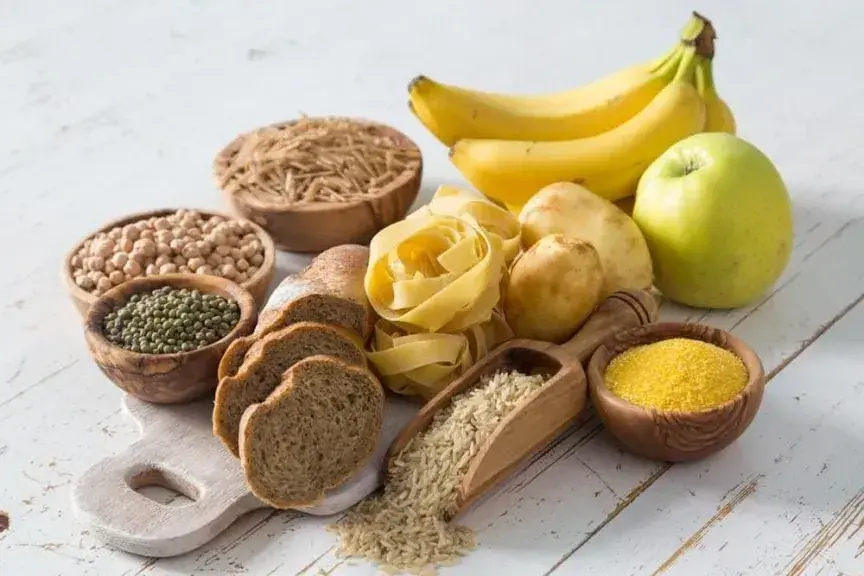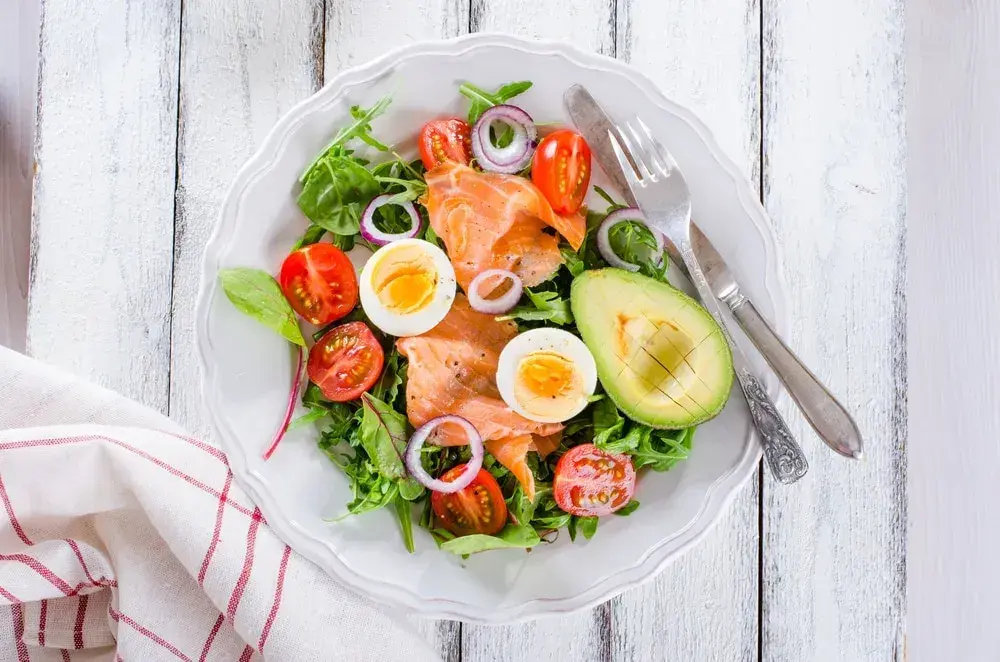
/assets/images/provider/photos/2579809.jpg)
Carbohydrates are essential for fueling your body with energy. Healthy carbs can help regulate your blood sugar, provide a lasting feeling of fullness, and lend to muscle growth. But not all carbs are created equal. It’s important to know the difference between carbs that can boost your energy levels, and carbs that can drain your energy, lead to weight gain, and increase your risk of future health problems.
Simple vs. complex carbs
Carbs fall into one of two categories: simple or complex. Simple carbs are generally higher in sugar and digest quickly. Eating simple carbs can give you a brief, rapid spurt of energy known as a sugar rush or sugar high.
Simple carbs will trigger your body’s release of extra insulin to regulate and decrease your blood sugar levels. Low blood sugar levels can lead to a sugar crash and cause mood swings, fatigue, and an increased appetite. Due to this ripple effect, you may eat larger food portions or make unhealthy food choices in an effort to get your blood sugar levels back to normal.
Complex carbs, on the other hand, tend to be high in fiber and digest more slowly, allowing you to benefit from sustained energy over a longer period of time. These healthy carbs can replenish your energy, regulate blood sugar, and lower your body’s absorption rate of fat and cholesterol. Complex carbs also regulate your mood and appetite, and help your body store energy in muscle tissue instead of fat tissue. If you’re an athlete or exercise regularly, complex carbs can contribute to a faster recovery and complement your weight-loss efforts.
When choosing carbs, opt for complex carbs, since these foods also offer vitamins, minerals, and other nutrients that help drive weight loss and boost your overall health.
Why healthy carbs are important
Healthy carbs boost your energy, provide you with lots of vitamins and minerals, regulate your bowel movements, and keep you feeling full for longer periods of time so you eat less. Healthy carbs also improve your gut health and cognitive function, helping ward off serious diseases like inflammatory bowel disease, Alzheimer’s disease, and cancer.
Healthy carbs contain a lot of fiber, which helps eliminate waste from your body. Vegetables and whole grains have insoluble fiber, which bulks up your stool and collects debris as it moves through your digestive tract. Healthy carbs also have soluble fiber, which works slightly differently in the way it attracts water and binds with fat and cholesterol. Together, both types of fiber take longer for your body to digest and have a minimal impact on blood sugar.
Why is regulating blood sugar so important? Simple carbs that digest too quickly can cause your blood sugar to spike, then crash. This leaves you feeling tired and triggers your cravings for more carbs.
Getting stuck in a cycle of eating simple carbs for an energy boost increases your risk of insulin resistance, prediabetes, and type 2 diabetes. Type 2 diabetes is a risk factor for other serious health problems including obstructive sleep apnea, nerve damage, kidney damage, high blood pressure, stroke, and heart disease.
A diet low in healthy carbs may also impair your memory and contribute to problems with concentration and attention span. However, a low-carb diet has also been shown to reduce symptoms in those who suffer from brain disorders like Alzheimer’s disease and epilepsy. If you’re not sure how carbs will affect your health, work with a doctor who can perform a DNA test and analyze your unique genetic markers to find out how your body uses and processes carbs.
Choosing complex carbs
Complex carbs have a low glycemic index and consist mostly of whole or minimally processed foods such as vegetables, fruits, whole grains, and beans. Complex carbs are ideal pre-workout foods because they lend to sustained energy, improved endurance, and less fatigue.
The following foods are good complex carbs to add to your healthy carbs list:
- Vegetables
- Fruits
- Sweet potatoes
- Leafy greens
- Quinoa
- Brown rice
- Legumes
Understanding simple carbs
While simple carbs should be consumed in moderation, not all simple carbs are bad for your health. For instance, simple carbs with a high glycemic index like Russet potatoes are packed with vitamins, antioxidants, and other nutrients that boost immunity and overall health. In most cases, simple carbs that are most harmful to your health include those that are processed, refined, and high in sugar.
Try limiting the following simple carbs in your diet:
- All forms of sugar
- Potatoes (excluding sweet potatoes)
- Breads
- Corn
- Pasta
- Pizza
- Pastries
- Cakes
- Cookies
- Candy
- Fruit snacks and gummies
- Sweetened yogurt
- Puffed cereal products, including rice cakes
- Soda and sugary beverages
- Refined white grains
- French fries
- Potato chips
- Tortilla chips
- Ice cream
- Jelly and sugary preserves
- Crackers
- Pretzels
- Beer
Can healthy carbs make you fat?
Healthy carbs won’t make you fat on their own. However, consuming an excess amount of calories and being physically inactive may cause you to gain weight even if you’re choosing mostly healthy carbs. Also, a diet high in simple, refined carbs can definitely contribute to weight gain, as many of these foods tend to be high in sugar, sodium, and a range of unhealthy additives. If your goal is to lose excess weight and become healthier, eliminate simple carbs from your diet and stick to eating fruits, vegetables, and lean protein.
How many healthy carbs per day should you eat?
Dietary guidelines say carbs should make up between 45 to 65% of your total daily calorie intake. This means that if you consume 2,000 calories per day, you should aim to consume between 225 and 325 grams of healthy carbs per day. However, everyone is different, and a person’s daily carb intake should be based on factors including age, gender, body composition, genetic makeup, physical activity level, and metabolic health.
For instance, people who do high-intensity exercises regularly and who have more muscle mass will metabolize carbs differently than those who are less active. A high-carb diet may do more harm than good for those who are overweight, obese, or who have type 2 diabetes. The best way to determine the amount of healthy carbs you should eat per day is to work with a weight-loss doctor who can perform a DNA test and help you create a personalized nutrition plan.
Can eating carbs make you tired?
Healthy carbs and simple carbs can both give you a jolt of energy, but the energy boost provided by simple carbs is short-lived and accompanied by a major sugar crash that leaves you feeling. This is due to the plunge in insulin levels that occurs after eating simple carbs. To prevent feelings of fatigue and exhaustion when eating carbs, choose healthy carbs and avoid simple carbs like white pasta, white bread, pastries, candy, and other processed foods high in sugar and flour.
Can eating carbs cause headaches?
The headaches you may experience after eating carbs is most likely due to the types of carbs you’re eating. Simple, refined carbs can make your blood sugar levels high enough to damage the nerves in your brain and eyes, triggering headaches and migraines. Headaches may also be accompanied by disorientation, shakiness, blurred vision, and frequent urination. If you suffer from headaches when eating carbs, limit your intake of simple carbs and eat more complex carbs.
Can eating carbs cause anxiety?
If you’re experiencing anxiety when eating carbs, it may be because you’re eating carbs high in sugar. Sugar can cause and worsen anxiety due to the way it spikes insulin and causes a sugar crash. Feeling tense, irritable, shaky, jittery, and nervous are all symptoms you can experience after eating too much sugar. If you’re in need of an energy boost, reach for healthy carbs instead of refined, sugary carbs to avoid and lessen your anxiety.
Can eating carbs cause joint pain?
Joint pain is often driven by inflammation. Sugary foods are linked to inflammation due to the way they increase the body’s insulin production and contribute to fat storage. Visceral fat in the body secretes inflammatory proteins and hormones that cause joint pain and chronic inflammation. Additionally, sugar is found to deplete important minerals in the body like magnesium, potassium, and calcium, which play a role in muscle contraction and relaxation. If you suffer from joint pain and arthritis, cut sugar from your diet — including the sugar in simple carbs like white bread, pastries, and muffins.
What foods have healthy carbs?
Whole foods like fruits, vegetables, nuts, seeds, legumes, and 100% whole grains are the types of carbs you should eat if you want to lose weight and stabilize your blood sugar. Healthy carbs can also help you increase muscle mass.
Here’s a healthy carbs list to help you get started:
- Apples
- Pears
- Blueberries
- Strawberries
- Blackberries
- Raspberries
- Bananas
- Grapes
- Peaches
- Cantaloupe
- Pineapple
- Oranges
- Grapefruit
- Mango
- Kiwi
- Pomegranate
- Plums
- Tomatoes
- Onions
- Okra
- Carrots
- Yams and sweet potatoes
- Beets (greens and roots)
- Radishes
- Cucumbers
- Asparagus
- Broccoli
- Kale
- Bok choy
- Spinach
- Zucchini
- Green beans
- Pumpkin
- Butternut squash
- Parsnips
- Kidney beans
- Chickpeas
- Split peas
- Pinto beans
- Black beans
- Lentils
- Quinoa
- Old fashioned or steel-cut oatmeal
- Brown rice
- Barley
How to add healthy carbs to your diet
- Swap fruit juices and fruit products for whole fruits. Whole fruits have more fiber and far less sugar than most processed fruit products, including most juice brands.
- Swap white breads for whole-grain breads. Most white breads are high in sugar and sodium, and contain ingredients and additives that contribute to weight gain.
- Lower your bread intake in general. Aim to consume more lean protein, fruits, and vegetables, and fewer bread products. Or, swap out high-carb loaves of bread with pitas, tortillas, and other lower-carb options.
- Swap out potatoes for beans. Beans are high in protein, digest slowly, and are an ideal substitute for potatoes at the dinner table. This also helps cut down on butter, sour cream, and other high-fat flavorings commonly added to baked and mashed potatoes.
- Try alternatives to some of your favorite high-carb foods, such as spaghetti squash instead of pasta, or mashed cauliflower in place of mashed potatoes.
Need help developing a weight-loss and nutrition plan that works for you? Garcia Weight Loss and Wellness Centers deliver customized plans, complete with personalized supplements and consistent support to help you reach and maintain your health goals. Contact us today for your no-cost consultation!



